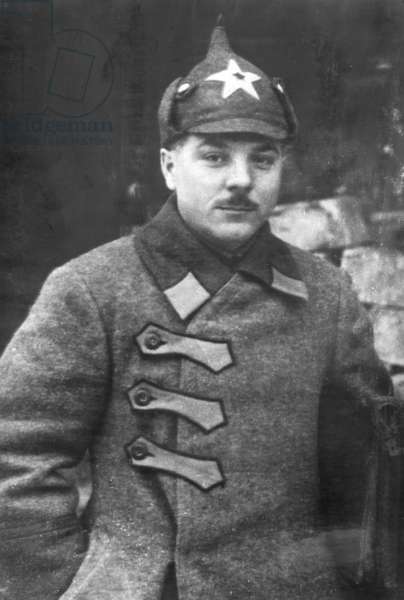On the one hand, he was extremely dedicated to achieving unconditional surrender. On the other hand, he was more willing to work with Stalin (afaik) than Truman, and Byrnes would never have become Secretary of State. Would FDR living to the end of WW2 have changed the outcome of the war with Japan?
Considering absolutely no one involved in the decision to drop the nukes actually thought it was necessary to do so, and FDR was a generally more reasonable person, I'd say he probably wouldn't have.
FDR would have been less likely because he wanted to be Teddy Roosevelt, who brokered the Soviet-Japanese peace a generation earlier and he would want to do that too! other than that, he was old money racist and wasn't as fervent about killing foreigners without a clear profit as many other US presidents. he's also one of the main ones to do anything good for the general public, so I give him some benefit of the doubt.
First time I saw the photo of FDR and Stalin at Yalta I was nonplussed. Cold War US culture taught me the Soviets and Americans were enemies always.
I had the opposite experience, I saw this photo in some history textbook in like 8th grade, and I didn't really know anything about Stalin except for a vague idea he was a bad guy. But then I saw his name as one of three people who "saved the world" and was like, damn I guess he was actually okay. Then all the anticommunist propaganda became much heavier in high school, but I think because my first real exposure to Stalin was as a man who saved the world, it never had the desired effect of me. I was willing to accept that Stalin became a bad guy later, but in the back of my head I was like "yeah but he saved the world."
I still remember how Textbooks and teachers. were banned from mentioning or showing photos of Elbe day (the day that Soviet and Us troops advances met up) in a bunch of states for awhile because it depicted both sides getting along.
that's interesting, I did not even know about this day. Yeah, looking back it's pretty interesting they included a propaganda poster praising Stalin in an American history textbook
Exactly my point. It was a major event that was heavily publicized since it meant the war was almost over but us never talked about
don't think he would have dropped it, however I don't have any specific evidence for this
He still would have dropped the bombs, but he was also the only one who could have put all of America's nuclear weapons under international control and stopped the arms race. Like if Henry Wallace tried that he would almost certainly have been couped. And while there is no universe where Truman would have considered it, even if he offered the Soviets didn't trust him or America enough to follow through.
I think a major reason the bombs were dropped on Japan is they weren't white.
Consider an alternate history "what if" for 1945. For the sake of simplicity...
-
Japan's leadership was wildly different and Japan surrendered to the US before nuclear weapons were used on them.
-
The USSR was entirely uninvolved in the war which means Germany is still very powerful and dangerous as late as 1945.
-
US military planners estimate Germany can fight on for at least five more years.
Would the US drop nuclear weapons on Germany? My answer is probably not.
Edit
Another thing to consider in our reality is - was the second bomb (the one used on Nagasaki) necessary? I assume the answer is no. The US government and military wanted to use it to test an alternative nuclear tech.
Japan was chosen as a target in 1943. The reasoning given was that the Germans would be more likely to gain information from a failed bombing and possibly then develop their own bombs, but yeah, racism has to play a role in that decision.
I guess my own initial response to my question is no though, because even Truman understood that once the Soviets invaded, Japan would likely surrender. The difference though is that Truman didn't want the Soviets to invade if he could avoid it, since him and Byrnes were so anti-Soviet, whereas FDR and Stettinius might be more willing to end the war with the help of the Soviets. FDR might've also included the Soviets on the Potsdam Declaration, ending the war sooner without the bomb.
I do agree FDR probably would've wanted to drop the bomb on Japan rather than Germany, but I think also FDR could've ended the war without dropping the bomb at all.
Would the US drop nuclear weapons on Germany? My answer is probably not.
After the firebombing of Dresden and Tokyo, I see little to suggest Americans would have drawn an kind of line.
Would Americans have been shy about nuking Normandy if they'd had the Bomb sooner? Would they have forgone dropping a nuke in Hamburg or Dusseldorf, preferring to destroy 75% of the respective cities the old fashioned way?
I doubt it.
Would Americans have been shy about nuking Normandy
The French might not have appreciated that one, though.
Neither was necessary. The US just hated Japanese and wanted to see what the bombs would do.
I'd say it was partly that, and partly an ego thing. The Japanese pretty much just wanted assurance that their emperor wouldn't be executed or anything, and the US had no intention of executing their emperor or anything. So any reasonable person would look at the situation and go "looks like there are no problems here, both sides want the same thing, let's see it happen" but the US thought that allowing your enemy to make any request at all makes you a little beta bitch or whatever and so they were literally willing to do anything to get the Japanese to agree that the US could execute the emperor if they wanted to
Even though they didn't want to
:amerikkka:
I haven't fully read this yet, but Tsuyoshi Hasegawa makes the point that once the Soviets invaded, suddenly surrender to the US looked a lot more inviting because of the Japanese leadership's fear of communism sweeping away the imperial institution. They thought the Americans would be much more likely to allow them to keep the emperor in place.
Truman and Byrnes were also extremely worried about public opinion. Most Americans at the time wanted the emperor removed from power in some way (executed or imprisoned, etc) and Byrnes thought Truman would be "crucified" if he was seen as going back on unconditional surrender.
and they were never going to remove the emperor from power. Most of the military leadership supported leaving the emperor in place. Afaik, there was never any real chance of the emperor being removed from power, at least by the US (could be wrong on that though). Just an insane push for unconditional surrender by Truman and Byrnes. Truly :amerikkka:
-
I remember in high school people made skits about American history after the AP US History test, as like an extra credit thing. One group's thesis was the Harry Truman "took the easy way out" by dropping the atom bomb, and so in their skit they had the staples "that was easy" button that he pushed to launch the nukes. And then they had an exploding bomb sound effect that followed the sound of the voice saying that was easy.
I don't think so. Japan was weeks away from surrendering, so you don't even need to have a president who's unwilling to use the bomb - just one who will wait a little longer before deciding to do it and will end up not having to.
Wikipedia articles from an alternate universe:
The Second Japanese War (known in Japan as the Independence War) took place from 1959-1973, pitting the Soviet-aligned Government of Northern Honshu and Hokkaido against the American-aligned Government of Japan. The war is considered a proxy war between the Soviet Union and the United States, and marks the closest the two countries ever came to being directly at war with each other, with both fielding ground and air forces directly on the Japanese Islands and operating aircraft carriers in nearby waters at various points throughout the conflict. Other countries that sent forces to the war include South Korea, South Vietnam, Thailand, Australia, New Zealand, the Philippines, China, North Vietnam, and North Korea. The war resulted in the Unification of Japan under the Japanese Communist Party, and is credited along with the Vietnam War with causing the American Constitutional Crisis of 1972 due to it's extreme cost and unpopularity with Americans.
(pictures, clockwise from the top-left: US Marines at Camp Zukeran, The sinking USS Antietam, A Communist propaganda poster depicting Japanese and Korean friendship (text: Our Class Enemies Are The Same!), Victims of the 1970 Kyoto Massacre)Well said. Good as he was in comparison, FDR was still an imperialist hawk







